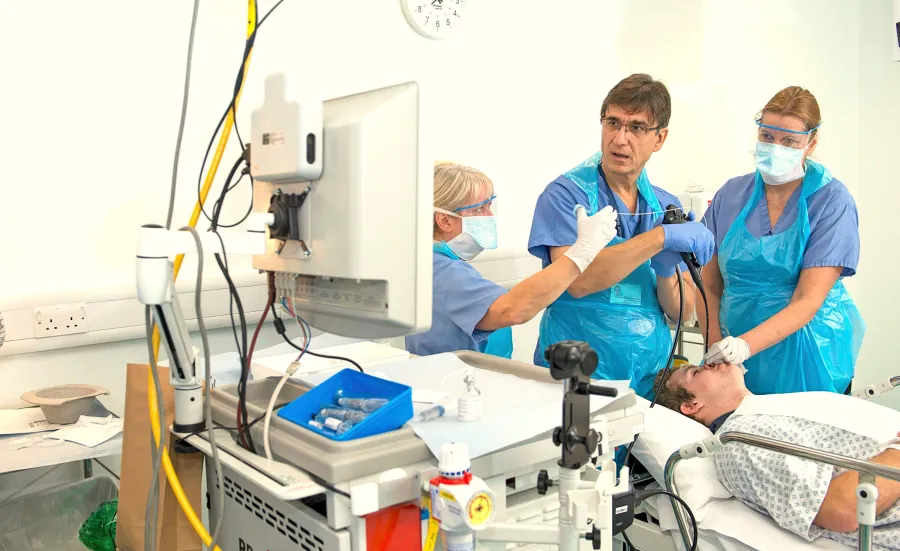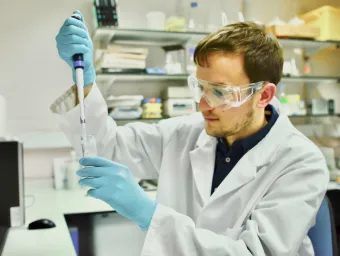Key facts
Helping improve air quality
Our respiratory research has influenced policy and legislation around pollution
Boosting adolescent health
Our dedicated teaching laboratory, LifeLab, helps young people understand science and make healthy choices
Pioneers in developmental origins of health and disease
We're a global leader in translating this knowledge to real-world health impacts
Overview
About the Faculty of Medicine
We are a national leader in medical education, investing in multidisciplinary research teams and creating opportunities for external collaborations. We have a reputation for translating new findings to clinical practice and for quality research.
We are integrally linked to the research and education delivery at University Hospital Southampton, particularly around discovery and translational research. Our continued success is derived from the contribution of our staff. We place great importance on the benefits arising from staff development.
In addition to our five schools, we are home to the Centre for Cancer Immunology and the newly established Institute of Medical Innovation. Both work closely with the Institute for Life Sciences to support and accelerate our impact. We are a founding member of the Wessex Health Partners. This partnership brings together universities and NHS trusts from across the region to accelerate improvements in health and social care.
We are integrally linked to research and education delivery at University Hospital Southampton, particularly around discovery and translational research.
Our diverse community of undergraduate students study medicine, the majority on the traditional 5 year course and a smaller proportion on our graduate entry course. We have a sector-leading widening access programme and an international course for bilingual German/English students. We offer a range of postgraduate taught courses attracting students from around the globe.
Medical Innovation Fund
We support life-changing research in cancer, dementia and infectious diseases. These are illnesses that are devastating lives across the world, but with your support, we can make a difference.
Research
Our research is focused around five pillars:
- population science
- developmental science and regenerative medicine
- infection and microbial science
- healthy ageing and multimorbidity
- cancer sciences
Supporting these pillars, we align our facilities and research support within five platforms:
- cell biology
- immunology
- clinical trials and experimental medicine
- systems biology and bioinformatics
- clinical data science
Health and care research
Research benefits everyone through the prevention of ill health, earlier diagnosis and more effective treatments.
We translate discoveries into real-world health gains through our partnership with the research and development team at University Hospital Southampton (UHS) and the wider clinical community.
Our research is delivered in clinical research centres and facilities at UHS. These include:
- NIHR Southampton Clinical Research Facility
- Southampton Clinical Trials Unit
- Experimental Cancer Medicine Centre
- MRC Lifecourse Epidemiology Centre
We are also home to the UK’s first Centre for Cancer Immunology and the NIHR Southampton Biomedical Research Centre. Both work closely with the Institute for Life Sciences to support and accelerate our impact.
We are a founding member of Wessex Health Partners. This partnership brings together universities and NHS trusts from across the region to accelerate improvements in health and social care.
Partnership with University Hospital Southampton (UHS)
Our decades-long partnership with UHS is crucial to our success. Our relationship draws strength from the very best of Southampton’s basic science research in:
- biomedical engineering
- biomedicine
- psychology
- social sciences
- electronics and computer science
- mathematics
Our partnership allows us to pursue excellence in health and social care research, education and professional practice.
Delivery is facilitated by the Southampton Academy of Research (SoAR) and Southampton Clinical Academic Training Scheme (SoCATS).
Equality, diversity and inclusion
In the Faculty of Medicine, we are committed to fostering an inclusive environment where everyone feels welcomed, valued, respected and supported. We believe that embracing and celebrating our diversity will:
- improve our wellbeing.
- enrich our community.
- strengthen our contributions to medicine.
We work with various teams, projects and people through our Faculty EDI Committee and our School EDI Committees, putting ideas into practice and sharing wins and successes. This ensures that all members of our community have a strong sense of belonging and there is evidence of equality, diversity and inclusion.
Research is vital to constantly improving medical and healthcare solutions for everyone. This could not happen without guidance and input from patients and the public.
We are committed to:
- working side by side with members of the public.
- embracing ideas from diverse voices in the communities around us.
- improving how we carry out and communicate our research.
- positively influencing policy and Government decisions on healthcare.
We bring public engagement to life in many ways, aiming to make getting involved with research inclusive and equal.
We are committed to the UK Research Concordat in supporting the next generation of research leaders. We welcome applications from researchers interested in applying for funding for fellowships. Our dedicated support team will guide you through the application process.
If you are considering applying for a fellowship and would like to register your interest, please email fmed-fellowships@soton.ac.uk with the funding scheme(s) you are interested in and a copy of your CV (optional).
Our fellows
-

Prof Miriam Santer
PPM research benefits patients, the public and the NHS. It supports fellowships for health professionals in primary care or public health, and methodologists from a range of disciplines.
-

Dr Stephen Lim
It is vital that older adults are involved in research that will improve their care and quality of life. My research focuses on innovative lifestyle interventions to promote healthy ageing.
-

Dr Helena Lee
Inherited eye disease is the commonest cause of childhood blindness. My research focuses on developing treatments that target abnormal retinal development in early childhood to prevent visual impairment in albinism.
-

Dr Jennifer Dewing
My Alzheimer’s Society fellowship is supporting me in investigating how ageing can modify the space between cells lining blood vessels of the brain and how this contributes to the build-up of toxic proteins in dementia.
What is a fellowship?
A fellowship is a personal award that helps researchers establish themselves as future leaders. It provides funding and time to focus on research, develop skills and advocate for their field.
It is important to take time to plan your fellowship application. Building your profile and network to create a strong application can take a significant amount of time. We recommend starting planning at least a year before your submission date.
Types of fellowships
Pre-doctoral fellowship
Pre-doctoral fellowships support people wanting to start or advance a research career. Applicants will usually have completed an undergraduate degree in a relevant subject area. They may hold a relevant master’s level qualification or be working towards one. Applicants without a master’s level qualification may use certain fellowships to undertake a master’s level qualification (e.g. a MSc, PGCert, PGDip, MRes or equivalent).
Doctoral fellowship
Doctoral fellowships support people looking to start a PhD. The funding offered can vary by scheme but generally they cover tuition fees, salary and research costs. Some schemes cap their funding while others are open.
Post-doctoral/advanced fellowship
Post-doctoral or advanced fellowships support people who have already earned their doctoral degree and are looking to build an impactful research career. Many of these fellowships are aimed at early career researchers with some post-doctoral research experience, wanting to transition to independence, i.e. become the Principal Investigator of their own award.
Funding schemes and opportunities
Some of the funding schemes available include:
- MRC career development awards
- NIHR fellowships
- The Royal Society University research fellowships
- UKRI Future Leader fellowships
- Wellcome Trust early career awards and career development awards
- BBSRC Discovery fellowships
- ERC starting, consolidator or advanced grants
Support for applicants
The Faculty of Medicine is committed to supporting researchers with fellowship applications. This includes advice on the application process and potentially introducing you to people who can help you through the process.
Honorary and visiting staff
We host many clinical and academic professional colleagues who are not employees, but who make a significant contribution to our profile. These appointments add to our external reputation and bring new ideas and capabilities to the organisation.
There are different categories of honorary titles within the Faculty. All of them require close collaboration with our Schools and Faculty.
Discuss an application with us
Email deanmed@soton.ac.uk to be put in touch with the relevant Head of School. They will help you identify a suitable role and talk you through the application process.
Portal for NHS staff accessing University systems
NHS-affiliated users can access University of Southampton applications without having to setup and maintain a separate user account. Visit our knowledge base to learn how to access our services.
Existing honorary and visiting staff
If you already have an honorary or visiting contract and are looking for further guidance, please visit our Sharepoint site. Please note that this is only available to existing staff members.
Driving the future of MedTech Innovation
Kargenera
Sooba Medical
Mini lungs
Our schools
-
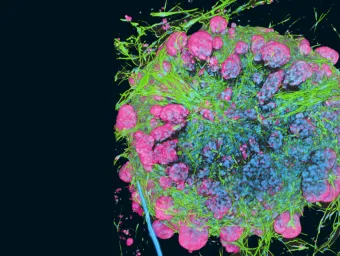
School of Cancer Sciences
We conduct a wide range of cancer research, from laboratory experiments to clinical studies.
-

School of Clinical and Experimental Sciences
We are breaking barriers in preclinical and clinical research for new biomarkers and treatments for respiratory, neurological, infectious, immunological and allergic conditions.
-

School of Healthcare Enterprise and Innovation
We're a community of researchers, healthcare professionals and educators with expertise spanning medicine, health, bioengineering and technology.
-
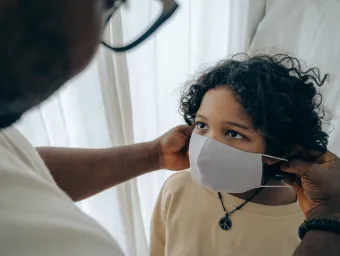
School of Human Development and Health
We are dedicated to advancing human health throughout people’s lives by leveraging cutting-edge research.
-
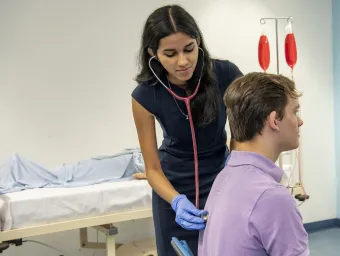
School of Primary Care, Population Sciences and Medical Education
Our internationally recognised multidisciplinary, high-impact research improves primary care and public health services, and the lives of patients and the wider population.
Research
Explore research activities across the faculty, and learn more about the work of individual research groups.
Our broader research community
Interdisciplinary research institutes and centres bring together specialists to share knowledge and solve problems.
-
Centre for Cancer Immunology
-
Institute for Life Sciences
-
MRC Lifecourse Epidemiology Centre
-
NIHR Biomedical Research Centre
-
NIHR School for Primary Care Research
-
NIHR Southampton Clinical Research Facility
-
NIHR Wessex Applied Research Centre
-
Southampton Clinical Trials Unit
-
Experimental Cancer Medicine Centre
Courses
We also offer 2 undergraduate courses with international partners:
-
MSc
Allergy
Typical offer: 2:2 degree
Duration: 2 to 5 years
-
PGCert
Allergy
Typical offer: 2:2 degree
Duration: 2 years
-
PGDip
Allergy
Typical offer: 2:2 degree
Duration: 2 to 4 years
-
MSc
Biomedical Sciences by Research
Typical offer: 2:1 degree
Duration: 1 year
-
MSc
Cancer Biology and Immunology
Typical offer: 2:2 degree
Duration: 1 year
-
MSc
Clinical Exercise Physiology
Typical offer: 2:1 degree
Duration: 1 year
Contribute to the field of medicine research by completing a PhD with us.
We also offer a Biomedical Sciences by Research MSc.
